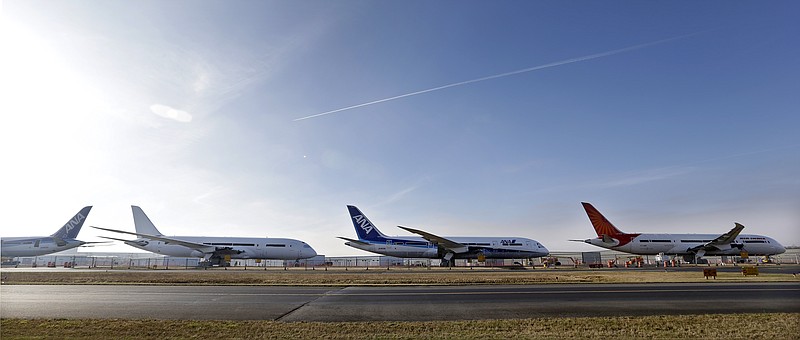The Obama administration's recent announcement that the EPA will begin crafting regulations to limit greenhouse gas emissions from airplanes started a whole new flurry of complaints - and no doubt lobbying efforts - about carbon concerns and climate change.
One first reaction we're already hearing is that it is about time we began to look at the pollution spewed from our flying machines.
But another reaction is the sobering realization that airplane emissions make up just 0.5 percent of global human-caused greenhouse gas emissions, according to researchers.
That's sobering not because it indicates we shouldn't bother with lowering it: Every little bit counts. But it's sobering since it is an indicator of how much more pollution comes from us just going about our everyday lives. Just being ordinary people on the planet.
According to the Intergovernmental Panel on Climate Change's Fourth Assessment Report, the burning of coal, natural gas and oil for electricity and heat is the big gorilla in the room, throwing into the atmosphere 26 percent of the carbon that continues to collect and choke our planet, making our future dicey.
The next big gorilla in the room is industry, which throws up 19 percent of greenhouse gas emissions - mostly by burning fossil fuels on-site for energy.
Then comes our land-use decisions: 17 percent of greenhouse gas is caused by deforestation, land clearing for agriculture, fires or the decay of peat soils. The IPCC says this does not include the carbon dioxide that ecosystems remove from the atmosphere, although recent estimates are that ecosystems on land remove about twice as much CO2 as is lost by deforestation.
Agriculture itself - the management of soils to grow things, livestock, rice production and biomass burning - contribute another 14 percent.
Now we get to transportation - 13 percent greenhouse gas pollution overall for road, rail, air and marine transportation, largely from gasoline and diesel use. The airplanes' 0.5 percent is part of that.
In homes that burn fuel for heat and cooking right there in the home, as opposed to electric power, add 8 percent of our greenhouse gas pollution.
And finally our trash in landfills makes methane and our flushes (and the sewer plants that process those flushes) add another 3 percent of greenhouses gases (methane) to the atmosphere.
Clearly, this is not an easy-to-fix problem.
We have made some baby steps. Now the EPA's proposal to declare that planes' carbon pollution threatens public health and welfare by significantly contributing to climate change - called an "endangerment finding" comes amid a push by the EPA for other contentious regulations aimed at wetlands and waterways, preparations to tighten fuel efficiency standards for heavy trucks and a midsummer launch for a landmark greenhouse gas rule for power plants.
The aircraft rules likely will take years to write and almost certainly will face opposition from the airline industry and its hefty lobby in Washington. As always, the biggest block is the GOP, which has taken to treating science and scientists like - well, a bunch of gorillas.
Sen. Tom Cotton, R-Ark., tweeted: "Just when I thought the EPA couldn't get more ridiculous."
Wisconsin Gov. Scott Walker, a potential Republican presidential contender, tweeted: "Another high cost power grab by @BarackObama's EPA."
Rep. Lamar Smith, R-Texas, chairman of the House Science Committee, predicted that the rules would increase the price of air travel and harm domestic airlines, and Sen. Lamar Alexander, R-Tenn., chairman of the Appropriations Subcommittee on Energy & Water Development, recently cosponsored legislation that would delay more clean air rules by prohibiting the EPA from implementing a new lower standard for ozone until 85 percent of counties that already can't meet air standards meet the existing standard. Huh? So we can't work to clean up air because we already have counties with dirty air?
Senate Environment and Public Works Chairman Jim Inhofe, R-Okla., denounced the proposal and (of course) threw the president under the bus, intimating that "conveniently," the president's travels on Air Force One would not be subject to the rules.
Really? If airplanes are built to be more efficient and less polluting, wouldn't a president's Air Force 1 plane be just as likely to be more cost-saving as commercial planes?
We may not like it that our world is changing, and we may not like or trust the new science and technology that we don't understand. But we do tend to like the new cars that get 50 miles per gallon and we certainly like our new heat pumps that make our homes more comfortable while cutting our power bills.
Apparently, most of all, we (and especially our lawmakers) just like to complain.
